欧盟英文介绍
- 格式:ppt
- 大小:298.50 KB
- 文档页数:25
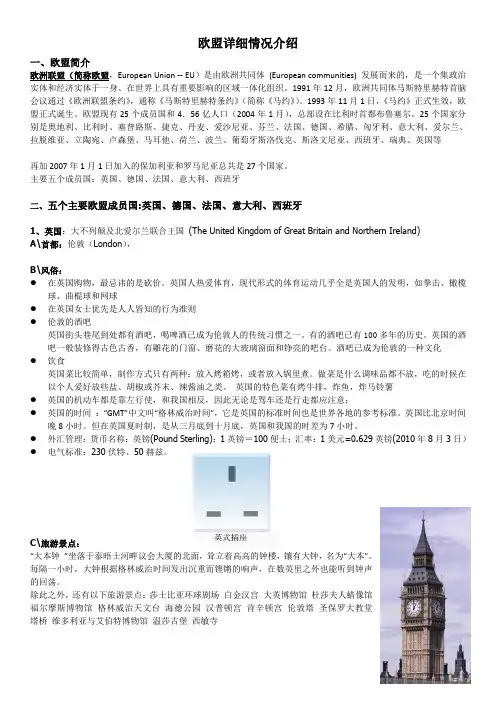
欧盟详细情况介绍一、欧盟简介欧洲联盟(简称欧盟,European Union -- EU)是由欧洲共同体(European communities) 发展而来的,是一个集政治实体和经济实体于一身、在世界上具有重要影响的区域一体化组织。
1991年12月,欧洲共同体马斯特里赫特首脑会议通过《欧洲联盟条约》,通称《马斯特里赫特条约》(简称《马约》)。
1993年11月1日,《马约》正式生效,欧盟正式诞生。
欧盟现有25个成员国和4.56亿人口(2004年1月),总部设在比利时首都布鲁塞尔。
25个国家分别是奥地利、比利时、塞普路斯、捷克、丹麦、爱沙尼亚、芬兰、法国、德国、希腊、匈牙利、意大利、爱尔兰、拉脱维亚、立陶宛、卢森堡、马耳他、荷兰、波兰、葡萄牙斯洛伐克、斯洛文尼亚、西班牙、瑞典、英国等再加2007年1月1日加入的保加利亚和罗马尼亚总共是27个国家。
主要五个成员国:英国、德国、法国、意大利、西班牙二、五个主要欧盟成员国:英国、德国、法国、意大利、西班牙1、英国:大不列颠及北爱尔兰联合王国(The United Kingdom of Great Britain and Northern Ireland)A\首都:伦敦(London),B\风俗:●在英国购物,最忌讳的是砍价。
英国人热爱体育,现代形式的体育运动几乎全是英国人的发明,如拳击、橄榄球、曲棍球和网球●在英国女士优先是人人皆知的行为准则●伦敦的酒吧英国街头巷尾到处都有酒吧,喝啤酒已成为伦敦人的传统习惯之一。
有的酒吧已有100多年的历史。
英国的酒吧一般装修得古色古香,有雕花的门窗、磨花的大玻璃窗面和铮亮的吧台。
酒吧已成为伦敦的一种文化●饮食英国菜比较简单,制作方式只有两种:放入烤箱烤,或者放入锅里煮。
做菜是什么调味品都不放,吃的时候在以个人爱好放些盐、胡椒或芥末、辣酱油之类。
英国的特色菜有烤牛排,炸鱼,炸马铃薯●英国的机动车都是靠左行使,和我国相反,因此无论是驾车还是行走都应注意;●英国的时间:“GMT”中文叫“格林威治时间”,它是英国的标准时间也是世界各地的参考标准。
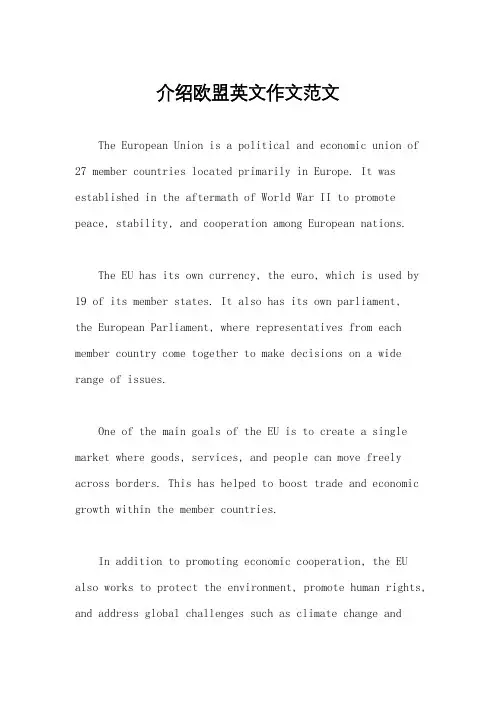
介绍欧盟英文作文范文The European Union is a political and economic union of 27 member countries located primarily in Europe. It was established in the aftermath of World War II to promote peace, stability, and cooperation among European nations.The EU has its own currency, the euro, which is used by 19 of its member states. It also has its own parliament,the European Parliament, where representatives from each member country come together to make decisions on a wide range of issues.One of the main goals of the EU is to create a single market where goods, services, and people can move freely across borders. This has helped to boost trade and economic growth within the member countries.In addition to promoting economic cooperation, the EU also works to protect the environment, promote human rights, and address global challenges such as climate change andterrorism.Despite its many achievements, the EU has faced criticism from some quarters for being too bureaucratic and distant from ordinary citizens. There have also been concerns about the impact of immigration and the rise of nationalist movements in some member countries.Overall, the European Union remains an important and influential player on the global stage, working to promote peace, prosperity, and cooperation among its member states.。
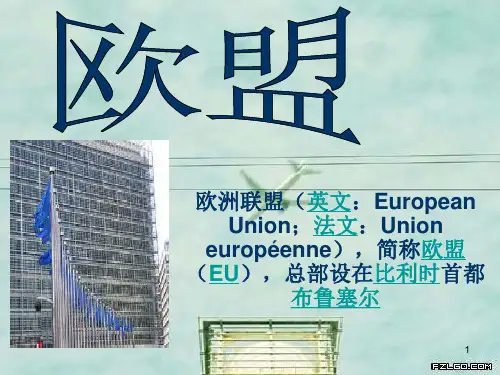
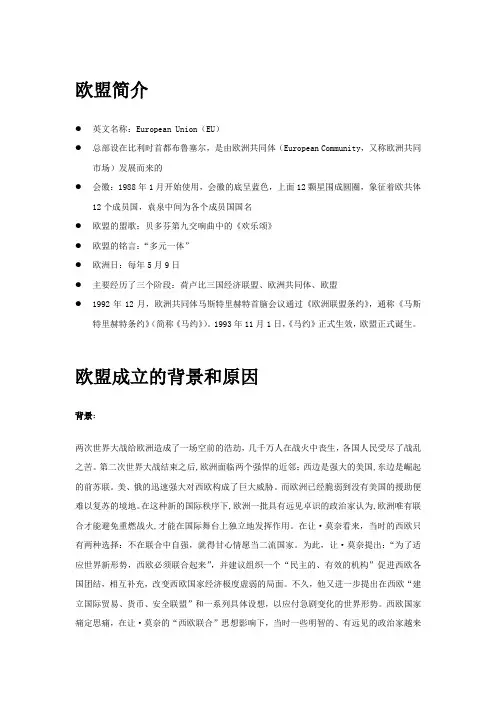
欧盟简介●英文名称:European Union(EU)●总部设在比利时首都布鲁塞尔,是由欧洲共同体(European Community,又称欧洲共同市场)发展而来的●会徽:1988年1月开始使用,会徽的底呈蓝色,上面12颗星围成圆圈,象征着欧共体12个成员国,袁泉中间为各个成员国国名●欧盟的盟歌:贝多芬第九交响曲中的《欢乐颂》●欧盟的铭言:“多元一体”●欧洲日:每年5月9日●主要经历了三个阶段:荷卢比三国经济联盟、欧洲共同体、欧盟●1992年12月,欧洲共同体马斯特里赫特首脑会议通过《欧洲联盟条约》,通称《马斯特里赫特条约》(简称《马约》)。
1993年11月1日,《马约》正式生效,欧盟正式诞生。
欧盟成立的背景和原因背景:两次世界大战给欧洲造成了一场空前的浩劫,几千万人在战火中丧生,各国人民受尽了战乱之苦。
第二次世界大战结束之后,欧洲面临两个强悍的近邻:西边是强大的美国,东边是崛起的前苏联。
美、俄的迅速强大对西欧构成了巨大威胁。
而欧洲已经脆弱到没有美国的援助便难以复苏的境地。
在这种新的国际秩序下,欧洲一批具有远见卓识的政治家认为,欧洲唯有联合才能避免重燃战火,才能在国际舞台上独立地发挥作用。
在让·莫奈看来,当时的西欧只有两种选择:不在联合中自强,就得甘心情愿当二流国家。
为此,让·莫奈提出:“为了适应世界新形势,西欧必须联合起来”,并建议组织一个“民主的、有效的机构”促进西欧各国团结,相互补充,改变西欧国家经济极度虚弱的局面。
不久,他又进一步提出在西欧“建立国际贸易、货币、安全联盟”和一系列具体设想,以应付急剧变化的世界形势。
西欧国家痛定思痛,在让·莫奈的“西欧联合”思想影响下,当时一些明智的、有远见的政治家越来越意识到西欧联合自强的重大战略意义。
原因:第一,欧洲认识到自身所处的不利地位。
战后的欧洲不再是世界舞台的主角,其位置被美国与苏联代替。
与这两个超级大国相比,欧洲是一个在军事上、政治上、经济上分割的小国集合。
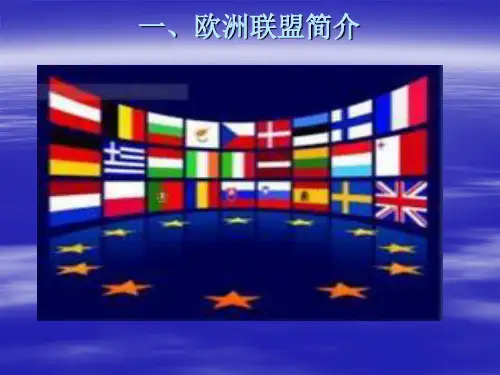
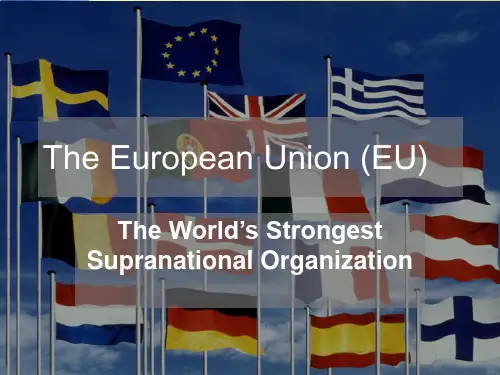
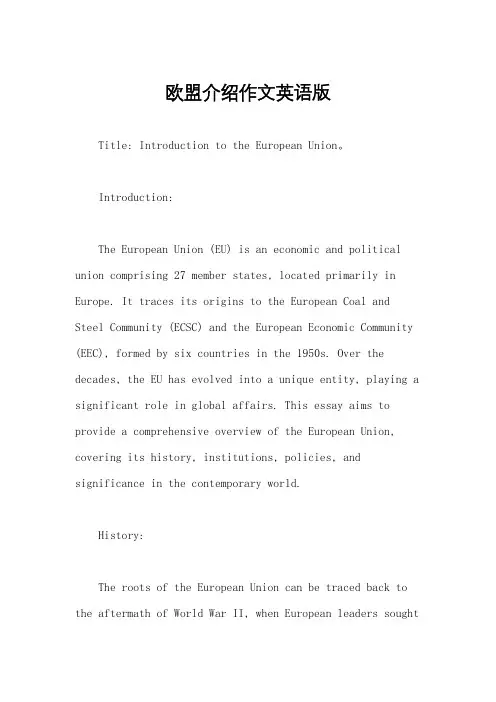
欧盟介绍作文英语版Title: Introduction to the European Union。
Introduction:The European Union (EU) is an economic and political union comprising 27 member states, located primarily in Europe. It traces its origins to the European Coal and Steel Community (ECSC) and the European Economic Community (EEC), formed by six countries in the 1950s. Over the decades, the EU has evolved into a unique entity, playing a significant role in global affairs. This essay aims to provide a comprehensive overview of the European Union, covering its history, institutions, policies, and significance in the contemporary world.History:The roots of the European Union can be traced back to the aftermath of World War II, when European leaders soughtto prevent future conflicts through economic integration. In 1951, the Treaty of Paris established the European Coal and Steel Community, which aimed to unify the coal andsteel industries of its member states. This initiative was followed by the signing of the Treaty of Rome in 1957, which created the European Economic Community and the European Atomic Energy Community. These treaties laid the foundation for what would eventually become the European Union.Institutions:The European Union operates through a complex system of institutions, each with its specific roles and responsibilities. The European Commission, based in Brussels, serves as the executive branch of the EU, responsible for proposing legislation and implementing EU policies. The European Parliament, consisting of directly elected representatives from each member state, acts as the legislative body, debating and voting on proposed laws. The European Council, composed of the heads of state or government of the member states, sets the EU's overallpolitical direction and priorities. Additionally, the Court of Justice of the European Union ensures the uniform interpretation and application of EU law.Policies:The European Union has developed a wide range of policies aimed at promoting economic prosperity, social cohesion, and environmental sustainability. The Common Agricultural Policy (CAP) aims to support farmers and ensure food security across the EU. The Single Market seeks to remove barriers to trade and investment, fostering economic growth and competitiveness. The EU also has policies addressing issues such as climate change, energy security, and migration, reflecting its commitment to tackling global challenges collectively.Significance:The European Union plays a crucial role in shaping the global political and economic landscape. As the world's largest single market, the EU is a major economic power,accounting for a significant share of global GDP and trade. Its common currency, the euro, is used by 19 of its member states, further enhancing its economic influence. Moreover, the EU's commitment to multilateralism and international cooperation has made it a key player in efforts to address global issues such as climate change, terrorism, and nuclear proliferation.Challenges:Despite its achievements, the European Union faces numerous challenges that threaten its unity and effectiveness. Brexit, the withdrawal of the United Kingdom from the EU, has raised questions about the bloc's future and strained relations with one of its largest members. Additionally, the EU grapples with internal divisions over issues such as migration, economic governance, and the rule of law, highlighting the complexities of governing a diverse union of sovereign states.Conclusion:In conclusion, the European Union stands as a remarkable example of regional integration and cooperation. From its humble beginnings as a coal and steel community to its current status as a global actor, the EU has achieved significant progress in promoting peace, prosperity, and solidarity among its member states. However, the challenges it faces underscore the need for continued reform and adaptation to ensure its relevance and effectiveness in the ever-changing world order. As such, the European Union remains a fascinating subject of study and debate for scholars, policymakers, and citizens alike.。
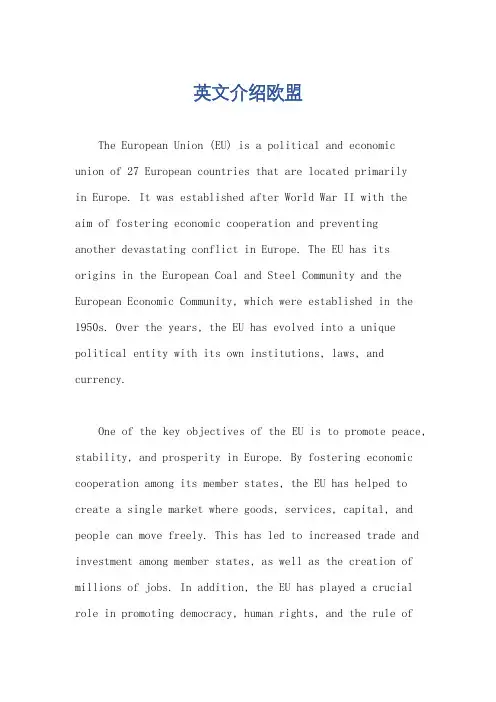
英文介绍欧盟The European Union (EU) is a political and economic union of 27 European countries that are located primarilyin Europe. It was established after World War II with the aim of fostering economic cooperation and preventinganother devastating conflict in Europe. The EU has its origins in the European Coal and Steel Community and the European Economic Community, which were established in the 1950s. Over the years, the EU has evolved into a unique political entity with its own institutions, laws, and currency.One of the key objectives of the EU is to promote peace, stability, and prosperity in Europe. By fostering economic cooperation among its member states, the EU has helped to create a single market where goods, services, capital, and people can move freely. This has led to increased trade and investment among member states, as well as the creation of millions of jobs. In addition, the EU has played a crucial role in promoting democracy, human rights, and the rule oflaw in Europe.The EU has its own institutions, including the European Commission, the European Parliament, the Council of the European Union, and the European Court of Justice. These institutions work together to make decisions on a wide range of issues, such as trade, agriculture, immigration, and the environment. The EU also has its own currency, the euro, which is used by 19 of its member states. The EU's common policies and regulations help to ensure a level playing field for businesses and consumers across Europe.In order to join the EU, a country must meet certain criteria known as the "Copenhagen criteria." These criteria include having a stable democracy, a functioning market economy, and the ability to adopt and implement EU laws and regulations. Once a country meets these criteria, it must negotiate a membership agreement with the EU and undergo a process of accession, which can take several years. Currently, several countries in Europe, such as Albania, North Macedonia, and Serbia, are in the process of seeking EU membership.The EU faces a number of challenges, including Brexit, the rise of populist and nationalist movements in some member states, and the ongoing refugee crisis. Brexit, the UK's decision to leave the EU, has raised questions about the future of the EU and its ability to maintain unity and solidarity among its member states. Populist andnationalist movements in countries such as Hungary, Poland, and Italy have challenged the EU's values of democracy, human rights, and the rule of law. The refugee crisis, which has seen millions of people fleeing conflict and persecution in the Middle East and Africa, has strained the EU's ability to manage migration and asylum policies.Despite these challenges, the EU remains a unique and powerful force for peace, stability, and prosperity in Europe. By working together, its member states can address common challenges and achieve common goals that would be impossible to achieve on their own. The EU's commitment to democracy, human rights, and the rule of law sets it apart as a beacon of hope and progress in an increasingly uncertain world.。
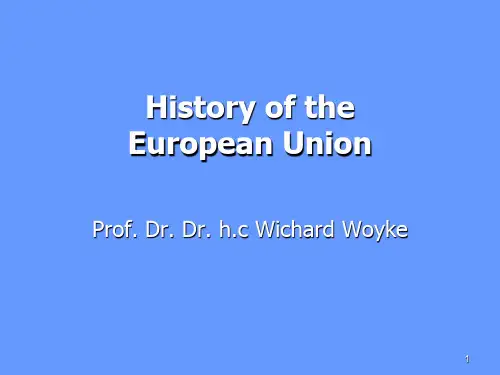
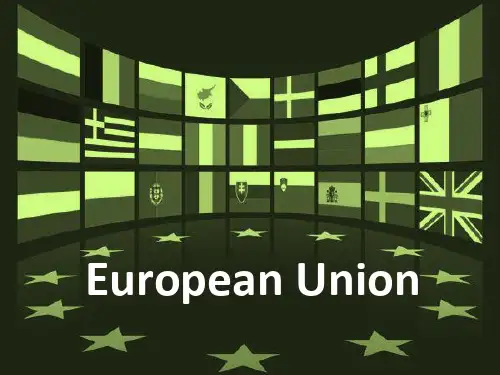
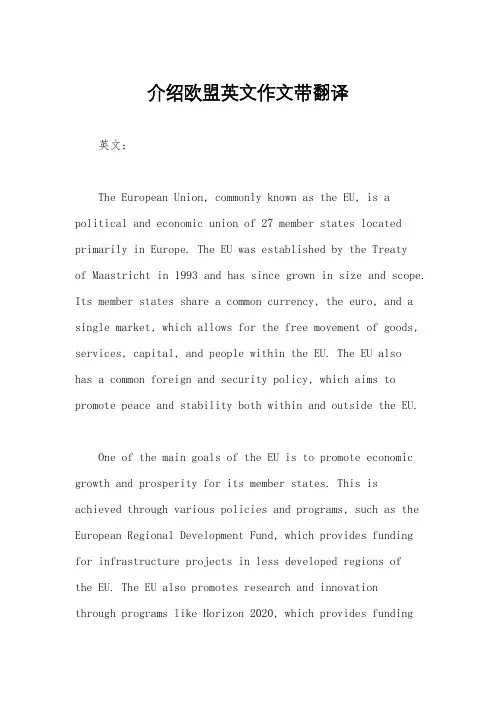
介绍欧盟英文作文带翻译英文:The European Union, commonly known as the EU, is a political and economic union of 27 member states located primarily in Europe. The EU was established by the Treatyof Maastricht in 1993 and has since grown in size and scope. Its member states share a common currency, the euro, and a single market, which allows for the free movement of goods, services, capital, and people within the EU. The EU alsohas a common foreign and security policy, which aims to promote peace and stability both within and outside the EU.One of the main goals of the EU is to promote economic growth and prosperity for its member states. This is achieved through various policies and programs, such as the European Regional Development Fund, which provides funding for infrastructure projects in less developed regions ofthe EU. The EU also promotes research and innovationthrough programs like Horizon 2020, which provides fundingfor research projects in areas such as health, energy, and the environment.In addition to its economic goals, the EU also aims to promote social justice and human rights. For example, the EU has established the European Social Fund, which provides funding for projects that aim to reduce poverty and promote social inclusion. The EU also has a Charter of Fundamental Rights, which outlines the basic rights and freedoms that all EU citizens are entitled to.Overall, the EU plays a crucial role in promoting cooperation and unity among its member states. By working together, the EU is able to tackle common challenges and achieve common goals, such as promoting economic growth, protecting human rights, and maintaining peace and stability.中文:欧洲联盟,通常称为欧盟,是由27个成员国组成的政治和经济联盟,主要位于欧洲。
欧盟介绍作文英语初一The European Union (EU) is a unique economic and political union of 27 member states located primarily in Europe. It has evolved from the aftermath of World War II, with the aim of fostering economic cooperation and preventing another devastating conflict in Europe. Here's an overview of the European Union:History: The precursor to the EU was the European Coal and Steel Community (ECSC), established in 1951 by six founding countries: Belgium, France, Italy, Luxembourg, the Netherlands, and West Germany. This laid the foundation for further integration. The Treaty of Rome in 1957 established the European Economic Community (EEC) and the European Atomic Energy Community (EURATOM), which aimed to create a common market among member states. Over the years, the EU expanded its membership and deepened its integration through various treaties, including the Maastricht Treatyin 1992, which created the European Union as we know it today.Membership: The EU currently has 27 member states, with Croatia being the most recent to join in 2013. Each member state maintains its sovereignty but also agrees to abide by EU laws and regulations, particularly in areas such as trade, competition, and environmental policy.Institutions: The EU is governed by several institutions, including the European Commission, the European Parliament, the Council of the European Union, the European Council, the Court of Justice of the European Union, and the European Central Bank. These institutions have various roles in policymaking, legislation, and enforcement within the EU.Single Market: One of the key achievements of the EU is the creation of a single market, which allows for the free movement of goods, services, capital, and people within the EU member states. This has facilitated trade and economic growth, benefiting both businesses and consumers.Currency: The majority of EU member states use the euroas their official currency, forming the Eurozone. The euro promotes economic stability and facilitates trade among member states.Policies: The EU implements various policies to address common challenges and promote cooperation among member states. These policies cover a wide range of areas, including agriculture, fisheries, regional development, immigration, climate change, and human rights.Challenges: Despite its successes, the EU faces several challenges, including Brexit—the withdrawal of the United Kingdom from the EU—which has raised questions about the future of European integration. Additionally, the EU grapples with issues such as economic disparities among member states, migration, and the rise of populist movements.Global Role: The EU plays a significant role in global affairs, advocating for multilateralism, human rights, and sustainable development. It engages in diplomatic efforts, trade negotiations, and development assistance to promotepeace, stability, and prosperity worldwide.In conclusion, the European Union is a complex and dynamic union of member states that has achieved remarkable progress in economic integration, political cooperation, and international influence. Despite facing challenges, the EU remains committed to its founding principles of peace, prosperity, and solidarity among European nations.。
Good morning/afternoon/evening. It is a great honor to stand before you today to introduce the European Union, an organization that has profoundly impacted the world we live in.The European Union, often abbreviated as EU, is a political and economic union of 27 member states located primarily in Europe. It wasestablished on November 1, 1993, following the ratification of the Maastricht Treaty. The EU aims to promote peace, stability, and economic growth among its member states, while also ensuring the protection of human rights and the rule of law.The EU has a rich history, dating back to the late 20th century when European countries sought to prevent another devastating war on their continent. The foundation of the EU can be traced back to the European Coal and Steel Community (ECSC) in 1951, which later evolved into the European Economic Community (EEC) and then the European Union.The EU has several key objectives:1. Peace and Stability: The EU was born out of the ashes of World War II. Its primary aim is to foster peace and stability among member states through cooperation and dialogue. The EU has played a crucial role in resolving conflicts and promoting reconciliation in various regions, including the Balkans.2. Economic Growth: The EU aims to promote economic growth andprosperity by eliminating trade barriers and creating a single market. The single market allows the free movement of goods, services, capital, and people within the EU, fostering economic integration and competitiveness.3. Social and Environmental Protection: The EU works to ensure high standards of living and social protection for its citizens. It has introduced policies and regulations to safeguard the environment, promote sustainable development, and combat climate change.4. Human Rights and Rule of Law: The EU upholds the principles of human rights, democracy, and the rule of law. It works to promote these values within its member states and beyond.The EU operates through various institutions, each with its own role and responsibilities:1. The European Parliament: The European Parliament is the EU's main legislative body, representing the citizens of the EU. Members of the European Parliament (MEPs) are elected every five years.2. The European Council: The European Council consists of the heads of state or government of the member states, the President of the European Council, and the President of the European Commission. It sets the EU's overall political direction.3. The European Commission: The European Commission is the EU's executive body, responsible for proposing legislation, implementing decisions, and managing the EU's day-to-day business.4. The European Central Bank: The European Central Bank is responsible for maintaining price stability in the euro area, which is the single currency used by 19 of the 27 member states.5. The Court of Justice of the European Union: The Court of Justice of the European Union ensures that EU law is interpreted and applied consistently across all member states.The EU has faced several challenges over the years, including economic crises, migration issues, and debates over sovereignty and national identity. However, it remains a powerful force for unity and progress in Europe.In conclusion, the European Union is an extraordinary organization that has brought together countries with diverse cultures, languages, and histories. Its achievements in promoting peace, stability, and economic growth are truly remarkable. As we look to the future, the EU will undoubtedly continue to play a vital role in shaping the world we live in.Thank you for your attention.。